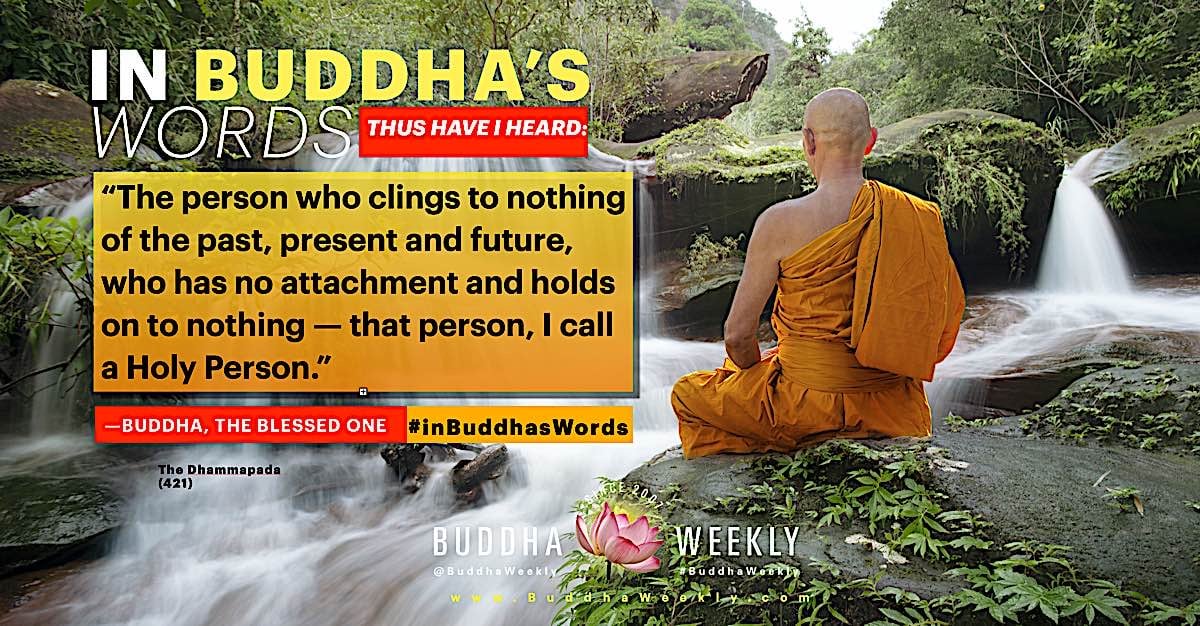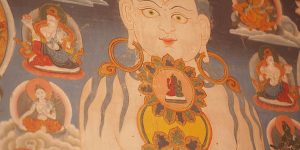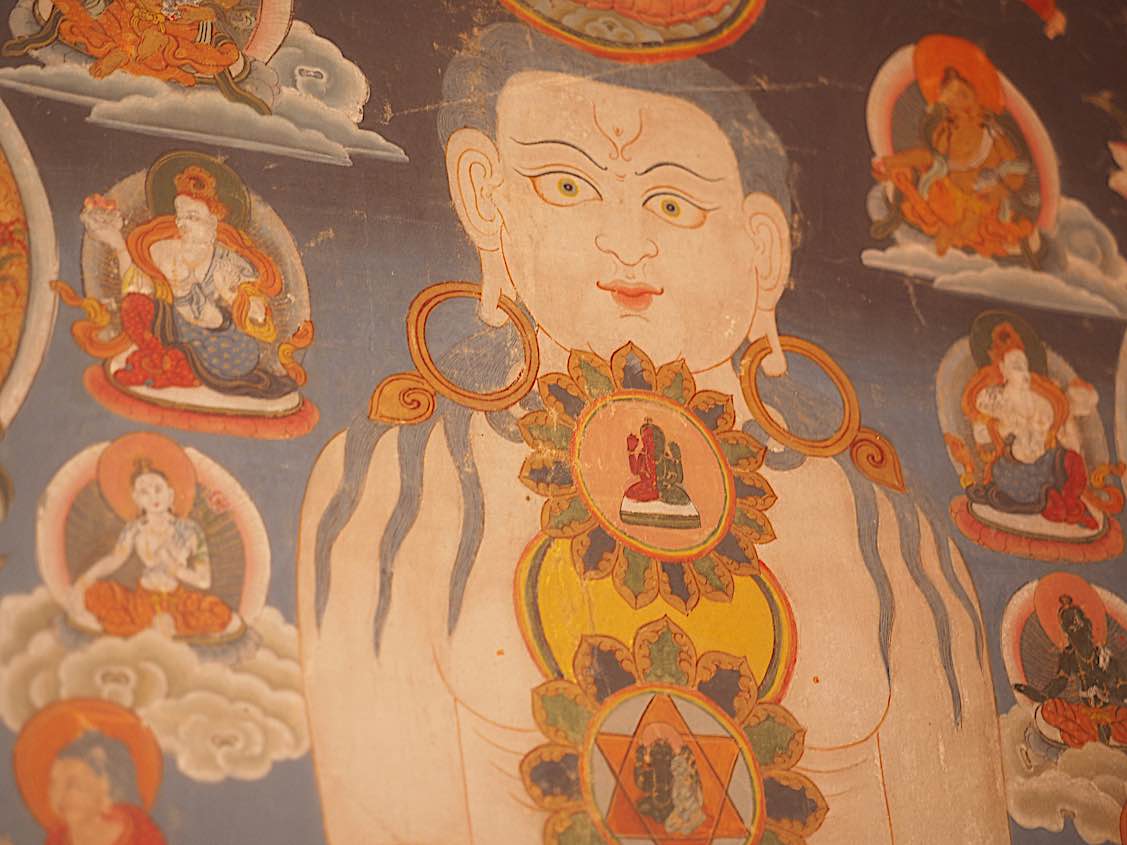In Buddhas Words: “The person who clings to nothing of the past, present and future…” #InBuddhasWords
“The person who clings to nothing of the past, present and future, who has no attachment and holds on to nothing — that person, I call a Holy Person.” — The Buddha
Cited from Dhammapada 421
As with all Dhammapada quotes, this is a very tight and rich “soundbite” with many nuances of meaning. Concepts of “mindfulness”, attachment and emptiness are all contained in this single line. For fuller context, the quote is wrapped by several illustrations of a “Holy Person.”
A note on translation
Although this is a verified “quote” it is translated from Pali. In this case, pronouns are awkward in translation, so “He” and “His and “She” and “Hers” are usually translated as He or “the person.” I most translations, this would read as “He who clings to nothing of the past, present and future…” where “he is generic in the same way we use the word “mankind” to mean all people. In the contextual example below, we left the more common translation “he” for simplicity of language.

Full context — The Holy Person
The above verse, Dammapada 421, was wrapped with other definitions of a “Holy Man”, found in the 26th section or chapter called Brahmanavagga, or “The Holy Man” or “The Holy Person.”
He begins by explaining what is “not” an Holy Man (below in Pali followed by English translation):
393. Na jaṭāhi na gottena na jaccā hoti brāhmaṇo,
yamhi saccañ ca dhammo ca so sucī so ca brāhmaṇo.
393. Not by matted hair, nor by lineage, nor by birth does one become a holy man.
But he in whom truth and righteousness exist—he is pure, he is a holy man.
Most of the verses are examples, though of what is a truly Holy Person:
391. Yassa kāyena vācāya manasā natthi dukkaṭaṃ
saṃvutaṃ tīhi ṭhānehi tam ahaṃ brūmi brāhmaṇaṃ.
391. He who does no evil in deed, word, and thought, who is restrained in these three ways—him do I call a holy man.
397. Sabbasaññojanaṃ chetvā yo ve na paritassati,
saṅgātigaṃ visaṃyuttaṃ tam ahaṃ brūmi brāhmaṇaṃ.
397. He who, having cut off all fetters, trembles no more,
who has overcome all attachments and is emancipated—him do I call a holy man.
398. Chetvā naddhiṃ varattañ ca sandāmaṃ sahanukkamaṃ,
ukkhittapaḷighaṃ buddhaṃ tam ahaṃ brūmi brāhmaṇaṃ.
398. He who has cut off the thong (of hatred), the band (of craving),
and the rope (of false views), together with the appurtenances (latent evil tendencies),
he who has removed the crossbar (ignorance) and is enlightened—him do I call a holy man.
399. Akkosaṃ vadhabandhañ ca aduṭṭho yo titikkhati,
khantībalaṃ balānīkaṃ tam ahaṃ brūmi brāhmaṇaṃ.
399. He who without resentment endures abuse, beating, and punishment, whose
power, real might, is patience—him do I call a holy man.
400. Akkodhanaṃ vatavantaṃ sīlavantaṃ anussutaṃ
dantaṃ antimasārīraṃ tam ahaṃ brūmi brāhmaṇaṃ.
400. He who is free from anger, devout, virtuous, without craving,
self-subdued, bearing his final body—him do I call a holy man.
401. Vāri pokkharapatte va āragge-r-iva sāsapo,
yo na limpati kāmesu tam ahaṃ brūmi brāhmaṇaṃ.
401. Like water on a lotus leaf or a mustard seed on the point of a needle,
he who does not cling to sensual pleasures—him do I call a holy man.
402. Yo dukkhassa pajānāti idh’eva khayam attano,
pannabhāraṃ visaṃyuttaṃ tam ahaṃ brūmi brāhmaṇaṃ.
402. He who in this very life realizes for himself the end of suffering,
who has laid aside the burden and become emancipated—him do I call a holy man.
NOTES
[1] Buddharakkhita, Acharya. The Dhammapada: The Buddha’s Path of Wisdom (p. 118). Pariyatti Publishing. Kindle Edition.
1 thought on “In Buddhas Words: “The person who clings to nothing of the past, present and future…” #InBuddhasWords”
Leave a Comment
More articles by this author
Search
Latest Features
Please support the "Spread the Dharma" mission as one of our heroic Dharma Supporting Members, or with a one-time donation.
Please Help Support the “Spread the Dharma” Mission!

Be a part of the noble mission as a supporting member or a patron, or a volunteer contributor of content.
The power of Dharma to help sentient beings, in part, lies in ensuring access to Buddha’s precious Dharma — the mission of Buddha Weekly. We can’t do it without you!
A non-profit association since 2007, Buddha Weekly published many feature articles, videos, and, podcasts. Please consider supporting the mission to preserve and “Spread the Dharma." Your support as either a patron or a supporting member helps defray the high costs of producing quality Dharma content. Thank you! Learn more here, or become one of our super karma heroes on Patreon.
Lee Kane
Author | Buddha Weekly
Lee Kane is the editor of Buddha Weekly, since 2007. His main focuses as a writer are mindfulness techniques, meditation, Dharma and Sutra commentaries, Buddhist practices, international perspectives and traditions, Vajrayana, Mahayana, Zen. He also covers various events.
Lee also contributes as a writer to various other online magazines and blogs.

















I always follow the Buddha’s teachings. This life becomes happy when you realize that Buddha is always in your heart.